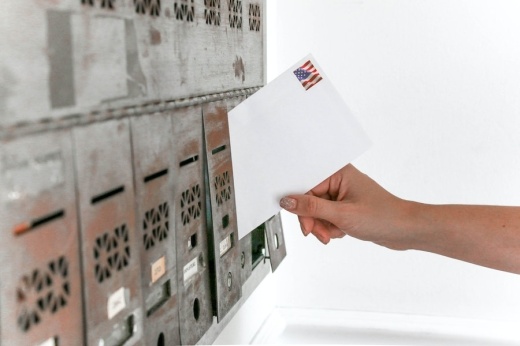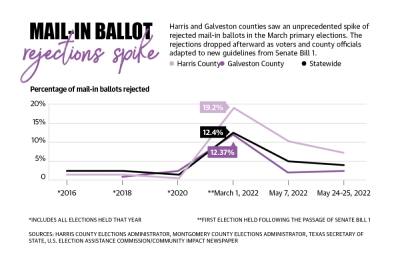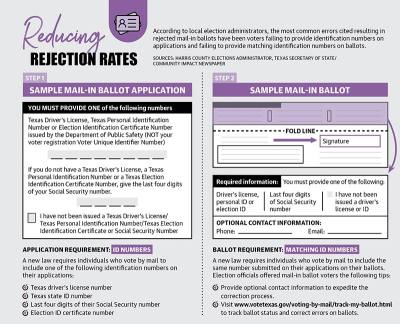In Bay Area counties, Harris County rejected 19.2%, or 6,934 ballots, and Galveston County rejected 12.37%, or 435 ballots. In the following May elections, the percentage of rejected mail-in ballots dropped as voters and election officials adapted to new guidelines, and county officials plan to participate in outreach efforts to lower rejections further by November.
One of the new requirements from SB 1, the voting reform bill, is the addition of reconciliation reports, in which counties must compare the number of valid voters with the total number of ballots counted. Texas secretary of state spokesperson Sam Taylor said this allows for more transparency.
“The reconciliation form that was added in SB 1 has been the biggest help for our office in terms of hunting down any issues that we see in the reporting of results,” Taylor told Community Impact Newspaper.
Another part of the bill states applications for ballot by mail, or ABBM, can be rejected if the information provided, such as a driver’s license number or a Social Security number, cannot be verified on the voter’s registration form.
“If the voter provides one or both of the required identification numbers but the voter’s voter registration record does not contain either number, the early-voting clerk must reject the ABBM and promptly notify the voter of the rejection,” Director of Elections Keith Ingram said in an elections advisory letter Jan. 28.
Effects on counties
Leah Shah, director of communications and voter outreach at Harris County, said about 89% of mail-in ballots in the March primaries were initially flagged for rejection. After a wave of corrections, the percentage of ballots rejected decreased to 19.2%.
“[The rejections] also resulted internally in a swell of phone calls. We had to scale up both our mail ballot team and our call center team to handle the influx—almost double in order to accommodate the issues,” Shah said.
<
The county saw a variety of challenges during the primaries, including up to 10,000 mail-in ballots that were not counted in time, causing former Harris County Elections Administrator Isabel Longoria to announce her resignation. Harris County selected Clifford Tatum, former general counsel for the U.S. Election Assistance Commission, as the new elections administrator July 5.
Shah said the rejections impacted senior citizens and voters with disabilities due to the eligibility rules in Texas, which require mail-in voters to be either at least 65 years old, sick, disabled, out of the country, expected to give birth, or confined to jail but eligible to vote.
“We’re getting a lot of calls from seniors specifically saying like, ‘Why would I write my Social Security number on a piece of paper and send it through the mail? I’ve been told not to do this,’” Shah said.
Galveston County did not experience the challenges Harris County faced to the same degree due to a difference in the volume of votes, Galveston County Clerk Dwight Sullivan said. He said Galveston County is much smaller, so election officials could reach out to more people with mail-in ballot issues.
In the May 24 runoff elections after the spike in rejections March 1, Galveston County’s rejection rates dropped from 12.37% to 2.35%. Similarly, Harris County’s rates decreased from 19.2% to 7.4%.
“In the March 1 primary we had a higher rejection rate than we did in the runoff, so you will see that people kind of learned the system pretty quick,” Sullivan said.
Clear Creek ISD’s election lawsuit
Elaina Polsen, chief communications officer for Clear Creek ISD, said the new guidelines from SB 1 caused an influx of mail-in ballot rejections in its May 7 election, in which 380 ballots, or 18.67% of mail-in ballots, were rejected in total. Polsen said the election process followed all of the rules from SB 1 and that the addition of the new mail-in ballot application and voter registration card verification step made the process more difficult.
“If there is no phone number on the forms, then you have no way of contacting [the voters],” she said.
The official results of the May 7 election showed the CCISD board of trustees Position 1 seat was won by Jessica Cejka with 1,290 votes over Misty Dawson’s 1,247 votes, a difference of 43 votes.
Dawson proceeded June 30 to file a lawsuit disputing the election results, alleging 15 mail-in voters were prevented from voting and 19 mail-in votes were from outside the District 1 boundaries, according to the lawsuit.
“Since the number of voters prevented from voting and the number of illegal votes counted exceeds the difference in the number of votes between [Dawson] and [Cejka], this court cannot ascertain the true outcome of the contested election and must declare it void,” the lawsuit stated.
Polsen said Dawson did not call for a recount of votes after the unofficial election results were released. She said Dawson was able to examine all cast ballots July 26, which resulted in Dawson conceding the alleged CCISD errors in counting election results could not be proven to change the election results, leading to a judge dismissing the lawsuit Aug. 17.
Adapting to new rules
After its unprecedented spike in mail-in rejections in May, CCISD plans to engage in voter outreach efforts to educate voters on how to properly submit mail-in ballots ahead of the May 2023 election, Polsen said. Board of trustees candidate filing for the school district starts in January.
Along with the mail-in ballot changes in SB 1 comes some changes to the role of a poll watcher in the state. Shah said the parameters around what a poll watcher can and cannot do within a polling center were generally loosened in the legislation, and November will have the first real test of the latest regulations.
“A poll watcher appointed under Chapter 33 [of the Texas Election Code] shall observe without obstructing the conduct of an election and call to the attention of an election officer any observed or suspected irregularity or violation of law in the conduct of the election,” Ingram said in a Feb. 4 elections advisory letter.
The state also mandated polling stations return to recording paper ballots, which many Galveston County voters will see at polling stations starting in November. Sullivan said voters may expect to see long lines at the beginning as people get used to the new hybrid paper and digital machines.
Sullivan said the Texas secretary of state’s office will send voters pamphlets and set up billboards ahead of the November elections to prepare voters for changes to voting rules. He said people whose mail application was rejected in many cases can go online to www.votetexas.gov to address their issue.
Shah said Harris County is taking actions to help educate the public on proper mail-in ballot use, including advertising, community outreach, implementing highlighted fields on applications and ballots, and altering the designs of ballots to make the requirements more prominent.
She advised voters heading into the November election to plan to vote early and said if anyone has questions regarding voting by mail to reach out to the Harris County elections administration general phone line at 713-755-6965.
“I anticipate that number [of rejected ballots] will continue to go down,” Shah said. “But we are still pushing a lot more resources toward mail ballots than we ever have before.”
Emily Lincke and Wesley Gardner contributed to this report.








